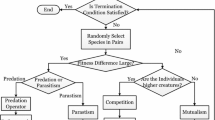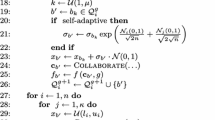Abstract
Cooperative co-evolution algorithms (CCEA) are a thriving sub-field of evolutionary computation. This class of algorithms makes it possible to exploit more efficiently the artificial Darwinist scheme, as soon as an optimisation problem can be turned into a co-evolution of interdependent sub-parts of the searched solution. Testing the efficiency of new CCEA concepts, however, it is not straightforward: while there is a rich literature of benchmarks for more traditional evolutionary techniques, the same does not hold true for this relatively new paradigm. We present a benchmark problem designed to study the behavior and performance of CCEAs, modeling a search for the optimal placement of a set of lamps inside a room. The relative complexity of the problem can be adjusted by operating on a single parameter. The fitness function is a trade-off between conflicting objectives, so the performance of an algorithm can be examined by making use of different metrics. We show how three different cooperative strategies, Parisian Evolution, Group Evolution and Allopatric Group Evolution, can be applied to the problem. Using a Classical Evolution approach as comparison, we analyse the behavior of each algorithm in detail, with respect to the size of the problem.











Similar content being viewed by others
References
Ahluwalia M, Bull L (1998) Co-evolving functions in genetic programming: dynamic ADF creation using glib. In: Evolutionary programming, pp 809–818
Amaya JE, Cotta C, Fernndez AJ (2010) A memetic cooperative optimization schema and its application to the tool switching problem. In: PPSN 2010, 11th international conference on parallel problem solving from nature, 11–15 September, Krakow, Poland. Lecture notes in computer science, vol 6238 and 6239. Springer, Berlin
Axelrod R (1984) The evolution of cooperation. Basic Books, New York
Barriére O, Lutton E, Wuillemin PH (2009) Bayesian network structure learning using cooperative coevolution. In: Proceedings of the 11th Annual conference on Genetic and evolutionary computation (GECCO 2009). ACM, New York, pp 755–762. doi:10.1145/1569901.1570006
Bongard J, Lipson H (2005) Active coevolutionary learning of deterministic finite automata. J Mach Learn Res 6:1651–1678
Boumaza AM, Louchet J (2001) Dynamic flies: using real-time parisian evolution in robotics. In: Boers EJ, Cagnoni S, Gottlieb J, Hart E, Lanzi PL, Raidl G, Smith RE, Tijink H (eds) Proceedings of the applications of evolutionary computing. EvoWorkshops2001: EvoCOP, EvoFlight, EvoIASP, EvoLearn, and EvoSTIM, Como, Italy. LNCS, vol 2037. Springer, Berlin, pp 288–297
Bucci A, Pollacj JB (2005) On identifying global optima in cooperative coevolution. In: GECCO ’05: proceedings of the 2005 conference on genetic and evolutionary, Washington, DC, USA
Chen W, Weise T, Yang Z, Tang K (2010) Large-scale global optimization using cooperative coevolution with variable interaction learning. In: PPSN 2010, 11th international conference on parallel problem solving from nature, 11–15 September, Krakow, Poland. Lecture notes in computer science, vol 6238 and 6239. Springer, Berlin
Collet P, Lutton E, Raynal F, Schoenauer M (1999) Individual gp: an alternative viewpoint for the resolution of complex problems. In: GECCO99, genetic and evolutionary computation conference, 13–17 July 1999, Orlando, FL, USA
Collet P, Lutton E, Raynal F, Schoenauer M (2000) Polar ifs + parisian genetic programming = efficient ifs inverse problem solving. Genet Program Evolvable Mach J 1(4):339–361
De Jong ED, Stanley KO, Wiegand RP (2007) Introductory tutorial on coevolution. In: GECCO ’07: proceedings of the 2007 GECCO conference companion on Genetic and evolutionary computation, London, UK
Dunn E, Olague G, Lutton E (2005) Automated photogrammetric network design using the parisian approach. In: EvoIASP 2005, Lausanne, nominated for the best paper award
Holland JH, Reitman JS (1978) Cognitive systems based on adaptive algorithms. In: Waterman DA, Hayes-Roth F (eds) Pattern directed inference systems. Academic Press, London, pp 313–329
Husbands P, Mill F (1991) Simulated co-evolution as the mechanism for emergent planning and scheduling. In: ICGA, Proceedings of the 4th international conference on genetic algorithms, San Diego, CA, USA, pp 264–270
Kauffman SA, Johnsen S (1991) Coevolution to the edge of chaos: coupled fitness landscapes, poised states, and coevolutionary avalanches. J Theor Biol 149(4):467–505
Landrin-Schweitzer Y, Collet P, Lutton E (2006) Introducing lateral thinking in search engines. GPEM Genet Program Evolvable Hardware J 1(7):9–31
Lutton E, Olague G (2006) Parisian camera placement for vision metrology. Pattern Recognit Lett 27(11):1209–1219
Ochoa G, Lutton E, Burke EK (2007) Cooperative royal road functions. In: Evolution artificielle, Tours, France, 29–31 October
Panait L, Luke S, Harrison JF (2006) Archive-based cooperative coevolutionary algorithms. In: Proceedings of the 8th annual conference on genetic and evolutionary computation, Seattle, Washington, USA
Popovici E, De Jong K (2006) The effects of interaction frequency on the optimization performance of cooperative coevolution. In: Proceedings of the 8th annual conference on Genetic and evolutionary computation, Seattle, Washington, USA
Potter MA, Couldrey C (2010) A cooperative coevolutionary approach to partitional clustering. In: PPSN 2010, 11th international conference on parallel problem solving from nature, 11–15 September , Krakow, Poland. Lecture notes in computer science, vol 6238 and 6239. Springer, Berlin
Potter MA, Jong KAD (1994) A cooperative coevolutionary approach to function optimization. In: PPSN, pp 249–257
Sanchez E, Schillaci M, Squillero G (2011) Evolutionary optimization: the \(\mu \)GP toolkit, 1st edn. Springer, Berlin
Sanchez E, Squillero G, Tonda A (2011) Group evolution: emerging synergy through a coordinated effort. In: Proceedings of the 2011 IEEE congress of evolutionary computation (CEC), pp 2662–2668. doi:10.1109/CEC.2011.5949951
Tonda A, Lutton E, Squillero G (2012) Lamps: a test problem for cooperative coevolution. In: Pelta D, Krasnogor N, Dumitrescu D, Chira C, Lung R (eds) Nature inspired cooperative strategies for optimization (NICSO 2011). Studies in computational intelligence, vol 387. Springer, Berlin, pp 101–120
Vidal FP, Louchet J, Rocchisani JM, Lutton E (2010) New genetic operators in the fly algorithm: application to medical PET image reconstruction. In: Di Chio C et al (eds) Evolutionary computation in image analysis and signal processing, EvoApplications 2010, part I, 7th–9th April, Istanbul Technical University, Istanbul, Turkey. LNCS, vol 6024. Springer, Berlin
Wiegand RP, Potter MA (2006) Robustness in cooperative coevolution. In: Proceedings of the 8th annual conference on Genetic and evolutionary computation, Seattle, Washington, USA
Wu S, Banzhaf W (2011) Rethinking multilevel selection in genetic programming. In: Proceedings of the 13th annual conference on genetic and evolutionary computation, ACM, pp 1403–1410
Acknowledgments
Acknowledgements for the funding received from the European Community’s Seventh Framework Programme (FP7/2009-2013) under grant agreement DREAM n. 222654-2.
Author information
Authors and Affiliations
Corresponding author
Rights and permissions
About this article
Cite this article
Tonda, A., Lutton, E. & Squillero, G. A benchmark for cooperative coevolution. Memetic Comp. 4, 263–277 (2012). https://doi.org/10.1007/s12293-012-0095-x
Received:
Accepted:
Published:
Issue Date:
DOI: https://doi.org/10.1007/s12293-012-0095-x




